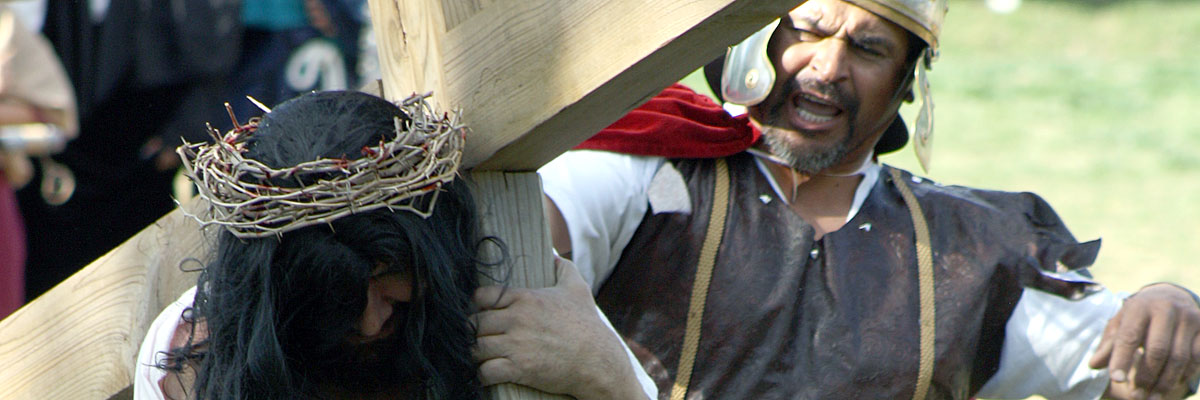Official Website of the
Catholic Diocese of Little Rock
22nd Sunday in Ordinary Time, Year A
Published: September 3, 2023
Bishop Anthony B. Taylor preached the following homily at St. Mary Church in Helena and the Cathedral of St. Andrew in Little Rock on Sunday, Sept. 3, 2023.

Bishop Taylor
In today's Gospel we have a very peculiar interaction between Jesus and Peter. In the passage preceding the one you heard today, Jesus declared that Peter is the rock on which he will build his Church.
Now in today’s passage he calls him a satan and accuses him of trying to make him trip and fall. What gives? Peter is OK with believing that Jesus is the Messiah, the Son of the Living God, but he can't handle the thought of Jesus' death. But this is the course he is on and so Peter's opposition to the cross is not helpful — indeed, his concern for Jesus' physical well being is an obstacle and a temptation.
Earlier the real Satan had tempted Jesus in the desert and at that time Jesus refused to use his miraculous powers to relieve his hunger, or to impress unbelievers or take a short-cut to establishing his kingdom. Now Peter tempts him as he begins to face the cross, and here Jesus steps over the trip hazard of Peter's misplaced concern: he will go to the cross.
Naturally none of us wants any of our loved ones to suffer, but God's plan for that loved one may be beyond our capacity to understand. The cross they have to bear may be what ends up saving their soul.
Every one of us has to face hurdles in this life, but as high as some of these hurdles are, it is the trip hazards that are the bigger threat. We see hurdles coming, and we prepare ourselves for the extra effort, but trip hazards catch us unprepared.
One moment we're on our feet; the next moment we're flat on the ground and don't know what happened. Most trip hazards are, in a way, small; that's why they're so dangerous. Naturally, Peter didn't want Jesus to suffer, but if that was God's will, if that was the price of our salvation, then to push for anything else was a trip hazard.
Naturally none of us wants any of our loved ones to suffer, but God's plan for that loved one may be beyond our capacity to understand. The cross they have to bear may be what ends up saving their soul.
I once had a parishioner who came to faith as a result of being arrested. His whole world had come crashing down and in his despair he turned to his wife’s religion for comfort. He attended RCIA here while he was out on bail and his case was awaiting trial and then later, after he had been convicted, I received him into the Church in jail.
One day he said something to me that I'll never forget. He said, "This is the most horrible thing I've ever had to go through, but you know, if I had not been arrested, I may never have come to faith. If this is the price of my salvation, then I guess it's worth it."
That's what Jesus is telling us. The cross is the price of our salvation — Jesus' cross, of course. But also, the crosses that we have to bear — and I can give you a long list of crosses. Crosses like illness, or a problem marriage, or problems with the kids. Crosses like unemployment or problems at work. Crosses like depression or loneliness or lack of self-confidence. Crosses like a struggle with alcohol in one’s life or in the lives of those whom God has entrusted to our care.
What hurdles do we face? When you invite Jesus to help you bear your cross, it can become salvific for you and for those who know you. And when Jesus uses you to help others to bear their crosses, these crosses can also become salvific.
Jesus implies that every person bears a cross — he says, “take up your cross and follow me” — and it is a serious trip hazard to deny it, to pretend that it isn't there. That's what Peter tried to do. And that’s what we are often tempted to do — wishing problems away instead of embracing them, embracing reality, the broken human condition.
Jesus says that whether we are willing to face it or not, the cross is there. The issue is what we do with it: that we take it up, that we embrace it, that we learn to love it: "Whoever wishes to come after me must deny himself, take up his cross and follow me."









